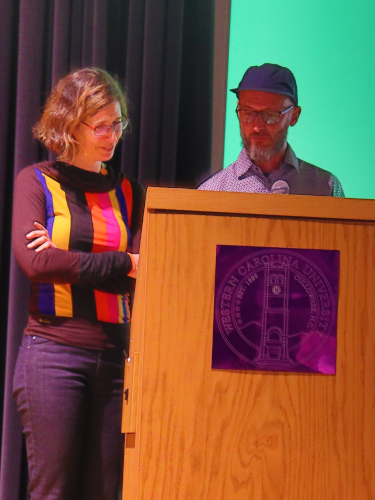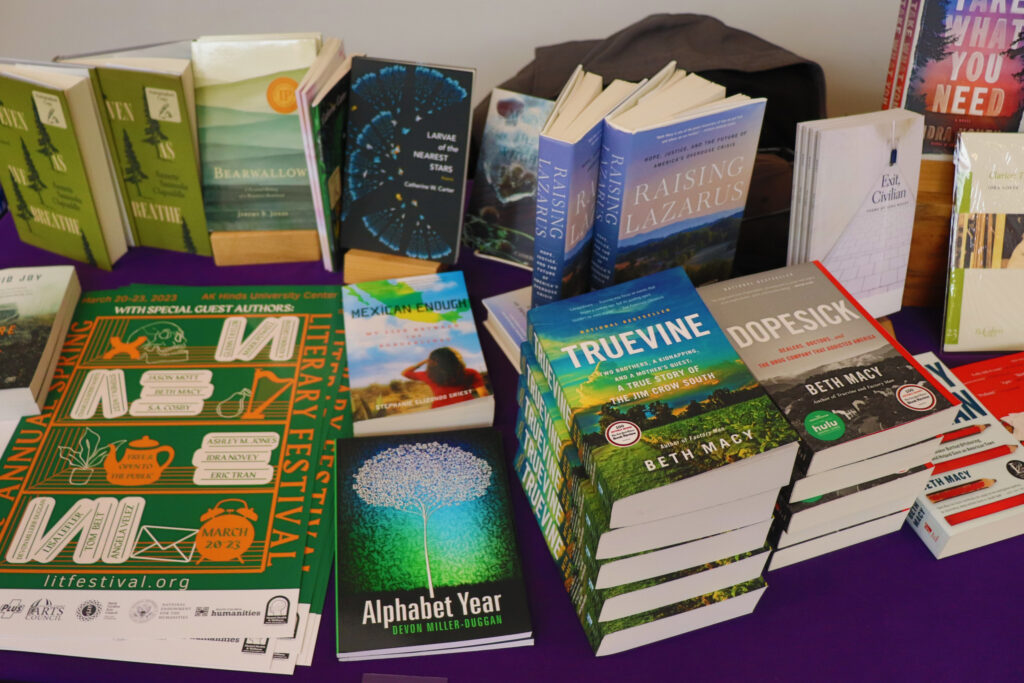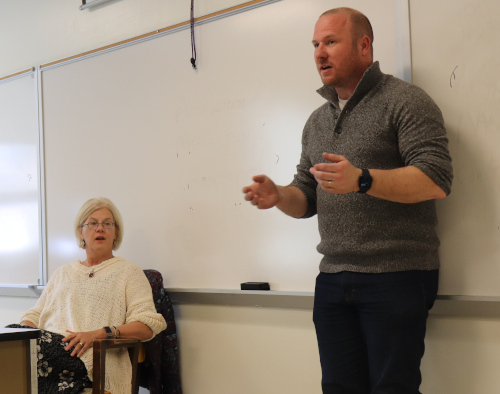The Spring Literary Festival has been a WCU tradition for 21 years, bringing established and emerging literary talent to campus and region. This year, the festival included 12 events and 15 writers sharing their stories with students and community from March 20 to 23.

Notable guests included Jason Mott, author of the 2021 National Book Award winning “Hell of a Book” and Beth Macy, author of the narrative nonfiction turned Hulu drama series “Dopesick.”
The current director of the LitFest is English Studies professor Jeremy Jones. This year, he was assisted by student intern Carina Blomberg. Jones raises funds for the festival, secures authors for the event and more, while Blomberg was in charge of the LitFest Instagram and designed promotional posters and flyers. With the help of student volunteers, they ensured that each event runs smoothly.
The festival is expensive and takes a long time to plan. According to Jones, the costs were about $40,000 this year. The funds came from external and internal grants, as well as financial support from the Office of the Provost and the College of Arts and Sciences. Grant funding came from the NC Arts Council, the NC Humanities, the Jackson County Arts Council, Campus Theme, and Visiting Scholar.
Jones had already begun working on next year’s festival in February, about 14 months in advance.
The LitFest is one of WCU’s largest events, with a huge impact on the student body and local community. Author and WCU distinguished professor Ron Rash with contest winners Abbie Cyr and Rachel Surrusco reflect on that in the video below.
A lineup of authors
Usually, the LitFest lacks a theme or organizing principle, aside from curating writers from many genres, places, and experiences. However, sometimes themes and patterns can emerge in the process unexpectedly.
“This year organically—or perhaps serendipitously—the festival has found a theme of rural life at its center,” said Jones. “Beth Macy is writing about addiction in the Appalachian region. S.A. Cosby is writing about rural black lives in Virginia. Idra Novey is writing about a family in the Allegheny Mountains. And on and on.”
While sharing a rural background, the authors were quite different in how they expressed their art. Some, such as Ashley M. Jones and Eric Tran, exclusively write poems, while others are primarily novelists, such as Cosby and Glenn Taylor. Angela Velez is an emerging young adult author, and Novey is an acclaimed translator along with her own work.

Jones is also committed to promoting a diverse range of voices at the LitFest. Like past festivals, the authors at the 2023 LitFest come from many racial and cultural backgrounds. Tran identifies as queer, and Nickole Brown has co-authored a book with her wife. Lisa J. Lefler and Thomas N. Belt brought knowledge of Native Health and Cherokee culture to WCU, where they have worked as faculty members.
The LitFest lineup presents unique perspectives on rural life—the kind of life many in the Sylva community are familiar with.
Opportunities for students
LitFest events are free for all members of the public, including students. Many English classes require students to attend events, so they are geared toward providing positive experiences for all students.
“The act of reading literature is an act of empathy,” Jones said. “A reader is trying to find a way into someone else’s experience, fictional or otherwise. I hope the literary festival offers students and community members an equally empathetic opportunity to engage with lives from difference places and experiences.”

Along with these emotional benefits, the LitFest seeks to reward student writers through the LitFest Creative Writing contest. Winners received a cash price of up to $400 and the chance to read their winning piece in the UC Theatre on March 22. The contests are judged by English department faculty and the visiting authors.
This year, the contest winners were Surrusco in the Fiction category, William Crooke in the Poetry category, and Cyr in the Nonfiction category. The separate Not Normal Creative Competition ties into this year’s campus theme of mental health. This contest included an art contest won by Lars Fusco and a writing contest won by Vero Orellana-Rivas. Graduate and high school students were also honored in separate contests.
All the winning pieces will be published in The Nomad, WCU’s student literature and art magazine. Its next edition is slated to be printed before the end of the next semester.
For those not winning the competition, the LitFest still has plenty of opportunities to find creative inspiration, learn about local issues, and hear the fascinating and often hilarious stories of writers. For Jones, the LitFest is a celebration of all the good literature brings to the world.
“We step into the UC every day for a week,” Jones said. “But we’re transported all over and should step away changed.”
The transformative power of literature is remarkable if students are willing to engage with it. Visiting author Taylor said it is best when speaking in the words of his new novel’s title character:
“All stories are songs,” Taylor said. “Better start dancing.”
Related stories: Women that move us: Beth Macy’s work and impact


